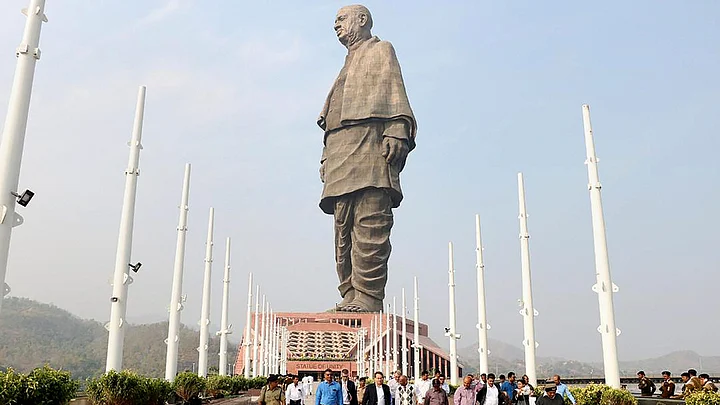The Statue of Unity has been pulling in massive crowds since it was opened to public by Prime Minister Narendra Modi on 31 October last year. According to the Tourism Corporation of Gujarat, over 7.8 lakh tourists have already visited the world’s tallest statue and the numbers are expected to reach 75 million by 2020.
But this tourist bonanza is not reflecting in the form of better pay for the hundreds of workers such as cleaners, sweepers, and liftsmen, among others who are employed at SoU.
On 11 March, several workers employed at the SoU went on a two-day strike demanding full payment of their salaries – on time and with increments.
After intense negotiations, Updater Services Limited (UDS) – the company that was contracted by the State government at SoU – agreed to regularise salary payments and offered an increment of Rs 700 to the striking employees.
It cost around Rs 3,000 crore to build the world’s tallest statue. Yet the when it comes to the salaries paid to the workers employed there, UDS is paying less than Rs 1 crore annually, despite the increment.
How It All Started
It started with reports which claimed that workers at SoU were not paid salaries for three months, which prompted them to go on strike. According to news portal NewsClick, over 100 employees were not paid for the last three months of work.
However, as the strike ended within a couple of days, the story didn’t garner much media attention. The Quint spoke with an employee who is part of the housekeeping team at Statue of Unity and asked him about the salary issues.
The employee, who requested anonymity, said
“In the last three months, we only received Rs 16,600 (approximately Rs 5,500 per month). This was not enough for us to sustain our daily lives. We had no option but to sit on a strike. But it ended in two days. The company officials and the collector met us and placated us.”SoU Employee (anonymous)
UDS told its employees that there was an aberration in recording their attendance, due to which there were issues is paying their salaries in full. The employee told The Quint that negotiations went on for two days and the company offered only a Rs 700 increment.
“They wanted to save costs by providing us bus services to and from Statue of Unity. We were not buying it. We wanted a higher increment. The company officials assured us that after 31 March, wages will be increased as per state government stipulations governing minimum wagers.”SoU Employee (anonymous)
UDS Claims to Pay Above Minimum Wage
The employee said that the company and the striking employees mutually signed an agreement to call off the strike and to address future issues amicably. “The company insisted that we end the strike as it will result in negative publicity for the national monument.”
The Quint also spoke with the vice president of UDS, Sameer Trivedi, who repeatedly said that the company has always been paying the employees over and above the state government-stipulated minimum wage.
“You need to understand that our employees stationed at SoU are locals who live near the monument. The government had directed us to employ at least one person from each of the SoU project-affected families,” Trivedi said.
Trivedi further added that only one person didn’t receive his salary for three months as there were issues with the bank where the employee held is account.
“In fact, we pay over and above the state’s prescribed minimum wage. The state government’s gross minimum wage is Rs 6,800 net take home. We paid them Rs 7,500 net take home. The issue is that the employees are irregular at work and instead of 26 days they work for 20 days. Thus, their pay was cut each month.”Sameer Trivedi, Vice President, UDS
Trivedi said that the employees demanded Rs 9,500 take-home pay, which was not feasible. “We have reached an agreement where in from 1 April the employees will get Rs 8,200 net take home.”
Although the strike ended amicably, a base salary of Rs 8,200 is quite meager, especially when rising inflation takes into account. Before the SoU was built, these workers toiled in their farms to make a living. But now in the form of compensation against loss of livelihood, these men and women are only earning a few hundred rupees over and above the government stipulated minimum wage.
